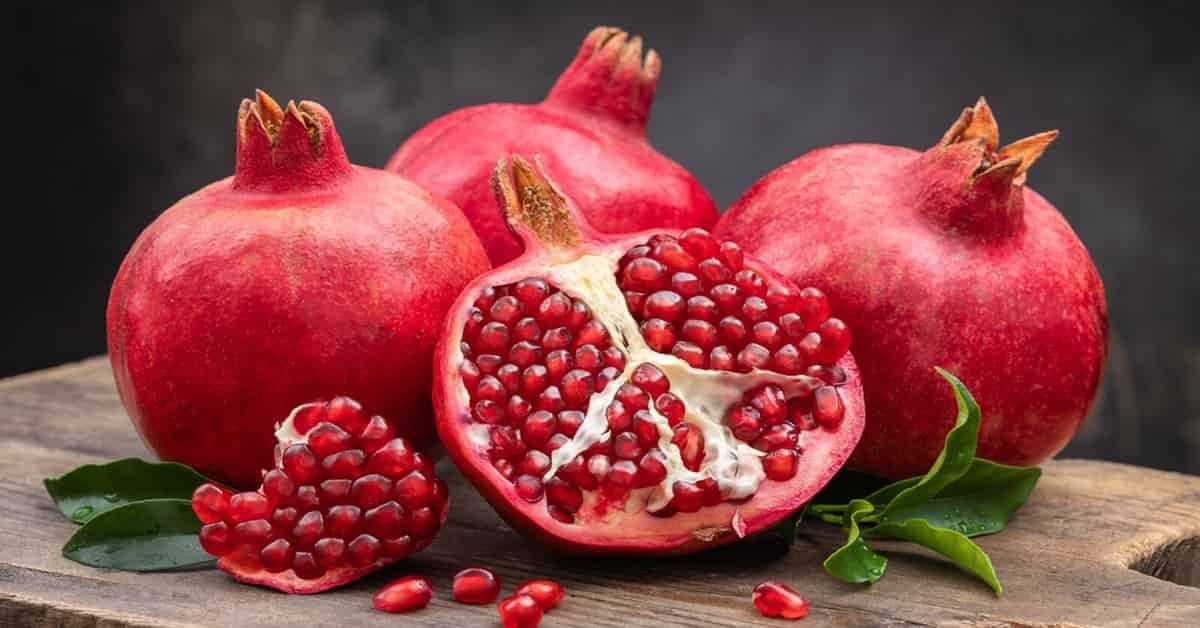Pomegranate (Punica granatum) is a nutrient-rich fruit revered for its juicy seeds, known as arils, that burst with flavor and health-promoting properties. This ancient fruit has been celebrated for centuries—not only for its taste but also for its impressive array of health benefits. Below, we will explore the nutritional value of pomegranates and the numerous advantages they offer for overall health.
Nutritional Profile of Pomegranate (per 100 grams)
Here’s a detailed breakdown of the nutritional values found in raw pomegranate seeds (arils):
- Calories: 83
- Water: 78%
Macronutrients:
- Carbohydrates: 18.7 g
- Sugars: 13.67 g
- Dietary Fiber: 4 g
- Protein: 1.67 g
- Fat: 1.17 g
Vitamins:
- Vitamin C: 10.2 mg (about 11% of the Daily Value)
- Vitamin K: 16.4 µg (about 14% of the Daily Value)
- Folate (B9): 38 µg (about 10% of the Daily Value)
- Vitamin E: 0.6 mg (about 3% of the Daily Value)
- Vitamin B6: 0.1 mg (about 6% of the Daily Value)
Minerals:
- Potassium: 236 mg (about 5% of the Daily Value)
- Calcium: 10 mg (about 1% of the Daily Value)
- Magnesium: 12 mg (about 3% of the Daily Value)
- Iron: 0.3 mg (about 2% of the Daily Value)
- Phosphorus: 36 mg (about 5% of the Daily Value)
Health Benefits of Pomegranate
- Rich in Antioxidants:
- Pomegranates are loaded with powerful antioxidants, including punicalagins and anthocyanins. These compounds help neutralize harmful free radicals in the body, reducing oxidative stress and preventing cell damage that can contribute to chronic diseases.
- Supports Heart Health:
- The antioxidants in pomegranates have been shown to lower blood pressure, reduce cholesterol levels, and improve overall heart health. They may also help prevent the buildup of arterial plaque and improve circulation, contributing to a lower risk of cardiovascular disease.
- Anti-Inflammatory Properties:
- Chronic inflammation is associated with many diseases, including heart disease, cancer, and diabetes. The anti-inflammatory properties of pomegranate can help combat inflammation in the body, making it beneficial for overall health.
- Improves Memory and Cognitive Function:
- Some studies suggest that pomegranate may enhance memory and cognitive function. Antioxidants found in pomegranates can help protect the brain from neurodegenerative diseases related to aging, such as Alzheimer’s disease.
- Boosts Immune System:
- Pomegranates contain a wealth of vitamin C and other immune-boosting antioxidants. Regular consumption can enhance the body’s ability to fight off infections and illnesses, particularly during cold and flu seasons.
- May Aid Digestion:
- The dietary fiber in pomegranates helps promote healthy digestion and regular bowel movements. It can aid in preventing constipation and support gut health by feeding beneficial gut bacteria.
- Supports Joint Health:
- The anti-inflammatory properties of pomegranates may benefit those with osteoarthritis and rheumatoid arthritis by reducing pain and improving joint function. Some studies have indicated that pomegranate extract may block the enzymes that contribute to cartilage breakdown.
- Potential Anti-Cancer Properties:
- Some preliminary research suggests that pomegranate may help inhibit the growth of cancer cells, particularly in prostate and breast cancers. The antioxidants and anti-inflammatory compounds may work together to reduce cancer progression, although further research is needed in this area.
- Regulates Blood Sugar Levels:
- Pomegranate juice may help lower blood sugar levels and improve insulin sensitivity. This can be particularly beneficial for individuals with diabetes or those at risk of developing the condition.
- Promotes Healthy Skin:
- The antioxidants in pomegranates can also help improve skin health by reducing signs of aging, improving elasticity, and promoting a youthful glow. Some studies suggest that pomegranate extracts can protect the skin from UV damage and support skin regeneration.
- Hydrating and Refreshing:
- With a high water content, pomegranates are hydrating and can be a refreshing snack option. They can help replenish fluids and electrolytes, especially in hot climates or after exercise.
- Versatile Culinary Use:
- Pomegranates can be enjoyed fresh, juiced, or used in various culinary dishes. Their sweet and tart flavor complements salads, yogurt, desserts, and even savory dishes. The seeds can also be used as a garnish for added texture and flavor.
Conclusion
Pomegranates are a powerhouse of nutrition, offering a wide range of health benefits. From their rich antioxidant content to their potential in supporting heart health, cognitive function, and skin health, incorporating pomegranates into your diet can significantly enhance overall wellness.
Whether enjoyed fresh as a snack, added to smoothies, drizzled over salads, or used in sauces and desserts, pomegranates provide a delicious and nutritious option for a healthy lifestyle.
FAQs about Pomegranate
Here are some frequently asked questions (FAQs) about pomegranate, a nutritious and vibrant fruit known for its unique flavor and health benefits:
1. What is a pomegranate?
A pomegranate is a round, red fruit with a thick, leathery skin and filled with juicy seeds (arils) that are edible. Its scientific name is Punica granatum, and it is native to the Middle East and South Asia but is now grown in many parts of the world.
2. What nutrients are found in pomegranates?
Pomegranates are rich in various nutrients, including:
- Vitamin C: Important for immune function and skin health.
- Vitamin K: Supports blood clotting and bone health.
- Potassium: Essential for heart health and muscle function.
- Antioxidants: Pomegranates are particularly high in polyphenols, especially punicalagins and anthocyanins, which contribute to their health benefits.
3. What are the health benefits of pomegranates?
Pomegranates offer several health benefits, including:
- Rich in antioxidants: Helps reduce oxidative stress and inflammation.
- Heart health: May lower blood pressure, improve cholesterol levels, and reduce the risk of heart disease.
- Anti-cancer properties: Some studies suggest that pomegranate extracts may inhibit the growth of cancer cells.
- Improved memory: Pomegranate juice may enhance memory and protect against age-related cognitive decline.
- Digestive health: The fiber in pomegranates supports a healthy digestive system.
4. How do you eat a pomegranate?
To eat a pomegranate, follow these steps:
- Cut off the crown (top) of the fruit.
- Score the skin with shallow cuts from top to bottom (be careful not to cut too deep).
- Break the fruit apart gently to expose the arils (seeds).
- You can eat the juicy arils directly or sprinkle them over salads, yogurt, or desserts.
5. Is pomegranate juice healthy?
Yes, pomegranate juice is considered healthy due to its high antioxidant content, vitamins, and minerals. However, it is also relatively high in sugar, so it’s best to consume it in moderation. Look for 100% pure pomegranate juice without added sugars for maximum health benefits.
6. Can you eat the seeds of a pomegranate?
Yes, the seeds (arils) of a pomegranate are edible and are the most flavorful part of the fruit. They are nutritious, providing fiber and various vitamins and minerals. You can eat them whole, but some people choose to chew them to access the juice inside while discarding the hard seed.
7. How do you store pomegranates?
Pomegranates can be stored in the refrigerator for up to two months. If you have already opened the fruit and removed the arils, keep them in an airtight container in the refrigerator, where they will last about five to seven days.
8. Are there any side effects of eating pomegranate?
Pomegranates are generally safe to eat for most people. However, excessive consumption may lead to digestive discomfort in some individuals. Additionally, if you are taking certain medications (like blood thinners), consult with a healthcare professional, as pomegranate juice may interact with them.
9. When is pomegranate season?
Pomegranates are typically in season from late summer to early winter, peaking in October and November in many regions. However, availability may vary depending on the climate and growing conditions.
10. What is the significance of pomegranates in culture and symbolism?
Pomegranates hold cultural and symbolic significance in various traditions. They are often associated with fertility and abundance and are featured in religious texts and art. For example, in Christianity, they symbolize resurrection and eternal life, while in Hinduism, they represent prosperity and fertility.


